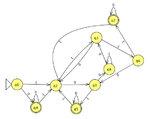elecs_gene
Member level 2

hi guys,
could u please help me in developing the state machine for detecting multiples of 5..that is output is 1 if any multiple of 5 is detected..the input comes serially..after the each input,you have to store it in some sort of infinite register and check for multiple of 5..
mukund
could u please help me in developing the state machine for detecting multiples of 5..that is output is 1 if any multiple of 5 is detected..the input comes serially..after the each input,you have to store it in some sort of infinite register and check for multiple of 5..
mukund









